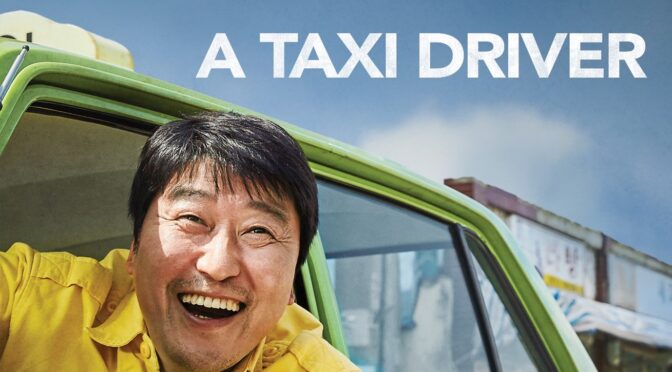A Ride through Resistance: Chronicling the essence of “A Taxi Driver”
Posted on : August 29, 2024Author : Ramaditya Ganguly

Movie name: A Taxi Driver (2017)
Director: Jang Hoon
Starring: Song Kang-ho, Thomas Kretschmann, Yoo Hae-jin, Ryu Jun-yeol
A Taxi Driver, directed by Jang Hoon, is a poignant and gripping historical drama that delves into one of South Korea’s most turbulent periods—the Gwangju Uprising of 1980. The film not only shines a light on this crucial event but also tells a deeply human story through the eyes of an ordinary man who becomes an unexpected hero while also shedding light on various aspects of life and the political climate at that point of time in Korea.
The film follows Kim Man-seob (Song Kang-ho), a widowed taxi driver in Seoul, who is struggling to make ends meet while raising his young daughter. One day, he overhears a conversation about a well-paying fare: a German journalist named Peter (Thomas Kretschmann) needs a ride to Gwangju. Enticed by the promise of a substantial payment, Kim agrees, unaware of the chaos and violence awaiting them. As they arrive in Gwangju, Kim and Peter find themselves in the midst of the uprising, where citizens are protesting against the military dictatorship. Peter is determined to document the atrocities committed by the military, while Kim initially just wants to get back to Seoul. However, as he witnesses the brutal crackdown and the courage of the protesters, Kim’s perspective begins to change. The bond between the cynical driver and the idealistic journalist grows stronger, and Kim decides to help Peter share the truth with the world.
Song Kang-ho delivers a masterful performance as Kim Man-seob, effortlessly portraying the character’s transformation from a self-centered, apolitical man to a courageous figure willing to risk his life for the greater good. His chemistry with Thomas Kretschmann, who plays the determined and compassionate journalist, is palpable and forms the emotional core of the film. Kretschmann’s portrayal of Peter adds a sense of urgency and moral clarity to the narrative. Jang Hoon’s direction is both sensitive and powerful, capturing the chaos and emotional intensity of the Gwangju Uprising with a keen eye for detail. The cinematography is stunning, contrasting the serene beauty of the Korean countryside with the harrowing scenes of violence and resistance in the city. The film’s pacing is tight, balancing moments of intense action with quieter, character-driven scenes.
The movie is not just a historical drama; it is a film about empathy, courage, and the power of the human spirit. It highlights the importance of journalism and the role of ordinary people in standing up against tyranny. The film also serves as a poignant reminder of the sacrifices made by those who fight for democracy and justice.
Furthermore, set in a period when South Korea was en route to becoming an Asian tiger economy and was yet to transition towards the vibrant liberal democracy that it is today, the film aptly reflects several aspects of connectivity that are of great relevance. Firstly, it highlights the tremendous importance of physical connectivity by showing the travels of the two protagonists, which lucidly illustrates the importance of transportation infrastructure in ensuring connectivity among different regions and communities underscoring how physical mobility facilities the exchange of information and solidarity in times of crisis. Secondly the film portrays the challenges and risks faced by journalists in disseminating information and thereby highlights the role of international media in connecting the global community to local events and issues, shaping international perceptions and responses. Lastly, the presence of Peter, a foreign journalist underscores the interconnectedness of the human rights struggle and democratic movements. Unsurprisingly, the film was banned in China as it reminded many of the 1989 Tiananmen Square incident in China, perhaps ironically showing that authoritarian dissent too is somewhat connected. The film also very lucidly portrays the human connections that are forged during that event, a factor which has somewhat lost its centrality during today’s rapidly changing world.
If we were to delve into this gerne of movies then several movies such as “1987: When the day comes” (2017), “The attorny” (2013), “City of life and death” (2009) and “Rang de Basanti” (2006) definitely come to mind. These films offer powerful narratives set against the backdrop of significant historical and political events, highlighting the resilience and courage of individuals in the face of adversity.
“A Taxi Driver” is a moving and thought-provoking film that successfully combines historical events with a deeply personal story. It pays tribute to the unsung heroes of the Gwangju Uprising and underscores the impact of their bravery on the fight for democracy in South Korea. With exceptional performances, skilful direction, and a compelling narrative, “A Taxi Driver” is a must-watch film that resonates on both an emotional and intellectual level. It not only enlightens but also inspires, leaving a lasting impression on its audience.
References:
1)https://maxcycollege.wordpress.com/portfolio/a-taxi-driver-film-review/
2)https://www.nytimes.com/2017/08/10/movies/a-taxi-driver-review.html
3)https://www.hollywoodreporter.com/movies/movie-reviews/a-taxi-driver-1027522/
4) Connectography :- Mapping the future of global civilization by Parag Khanna
Ramaditya Ganguly,
Intern at Asia in Global Affairs
The views, thoughts, and opinions expressed in the text belong solely to the author, in his personal capacity. It does not reflect the policies and perspectives of Asia in Global Affairs.





Leave a Reply